The Importance of Ramadan to the Video Games Industry
By The Editor on 26/04/2021
As we continue to equip ourselves in the games industry with more knowledge and resources to be as accessible and inclusive as possible, there is no doubt amazing celebrations and cultural moments will become known to us all across the sector, to celebrate or at the very least be aware of as members of our teams may celebrate them. One such cultural moment that is happening currently as we speak is Ramadan; which is celebrated by many games industry professionals who are Muslims.
Ramadan
Ramadan is the ninth month of the Islamic calendar, arguably, one of the most well-known religious periods for Muslims worldwide as a month of spiritual reflection for self-improvement, heightened devotion and community. Ramadan is regarded as one of the Five Pillars of Islam and lasts twenty-nine to thirty days, from one sighting of the crescent moon to the next; resulting in Ramadan having no set date in the calendar but it is common practice to follow the timetable of the where you live in which night can be distinguished from day.
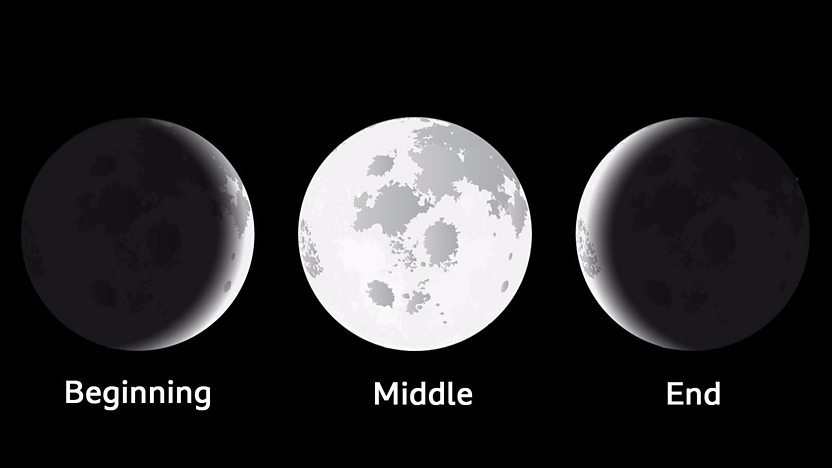
The fast (Known as sawm) is one of the main practices of Ramadan which requires the abstinence from food and drink from dawn to sunset for up to thirty days and is seen as fard (Otherwise known as a religious duty) for all adult Muslims who are not at health risk. Though this does not mean Muslims go thirty days without food as it is common to have one meal (Known as the suhoor), just before dawn and another (Known as the iftar), directly after sunset. Fasting allows Muslims to devote themselves to their faith. It is thought to teach self-discipline and reminds them of the suffering of the poor.
Eid ul-Fitr
The end of Ramadan is declared after a crescent new moon has been sighted, although Muslims in most countries wait for an official sighting to be announced, rather than scanning the skies themselves which is often declared after completion of thirty days of fasting.
This marks the start of 'Eid ul-Fitr' (The Festival of the Breaking of the Fast), and the beginning of Shawwal (The next lunar month). Muslims are not only celebrating the end of fasting, but thanking Allah for the strength He gave them throughout the previous month to help them practice self-control, restraint and generosity.
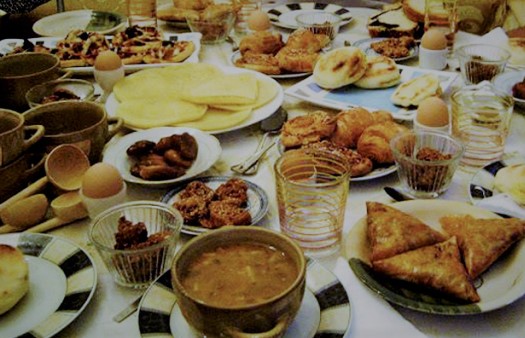
Two Eids?
This is not to be confused by Eid ul-Adha, also known as the Greater Eid or the Feast of the Sacrifice. A time when Muslims come together to celebrate the obedience of the Prophet Ibrahim (as), when he submitted to the will of Allah and offered his son as a sacrifice; however Allah prevented the sacrifice at the last minute and provided a ram as an alternative offering.
Eid ul-Adha is celebrated around the world with the sacrifice of cows, sheep and goats, where the meat is then distributed to the poor and needy, as well as among family and friends. This is known as the Qurbani sacrifice, and allowed Muslims worldwide to follow in the footsteps of the Prophet Ibrahim where special meals will be shared with loved ones, special prayers and it’s forbidden to fast on the 10th day of Dhul Hijjah, the 12th month of the Islamic calendar. A vital practice also coincides with this day when an estimated 4 million Muslims annually make the holy pilgrimage of Hajj (Also known as the annual Islamic pilgrimage to Mecca in Saudi Arabia) to perform ancient rituals that connect them to God and enable them to receive His forgiveness. Hajj is a once-in-a-lifetime activity that is a religious duty for those who can afford it, and who haven't already performed it.
The reason why there are two Eids is because the word 'Eid' means 'feast' or 'festival'. Each year Muslims celebrate both Eid al-Fitr (The festival of the breaking of the fast that is celebrated at the end of Ramadan) and Eid al-Adha (The feast of the sacrifice that is celebrated just over two months later, at the same time when many Muslims perform the Hajj pilgrimage), but the names often get shortened to just 'Eid'; which is why it can be confusing yet important to differentiate due to them being very different festivals with different features and meanings.
Accounts, Experiences and Stories
Along with the introductory information above, we were fortunate enough to speak to various individuals between both the Sony Interactive Entertainment and Ukie teams who were able to share more around Ramadan and Eid ul-Fitr:
Taher Elahi, Senior Internal Auditor at Sony Interactive Entertainment:

Ramadan is significant as it’s believed to be the holiest month for Muslims, since it’s celebrated across the world by Muslims at the same time. Equally importantly, it is believed that this was the time when God (Allah) gave the first chapters of the Quran (Islamic holy text) to the prophet Muhammed.
Ramadan is celebrated primarily through the act of fasting, which involves no eating or drinking during daylight hours. You may eat before dawn (Known as Suhoor / Sehri in Urdu) and then you open the fast once the sun sets (Known as Iftar / Iftari in Urdu); I find this never ceases to surprise / shock people. In addition to fasting, Muslims also abstain from any bad habits during Ramadan. Though Fasting is one of the five pillars of Islam and so is an act of worship to God (Allah). It allows Muslims to increase their spirituality during the month as well as getting closer to their faith. In my opinion, it actually teaches a lot of discipline and patience.
Most of my favourite memories of Ramadan go back to when I was growing up in Pakistan (Which now seems like a long time ago). One of the stand out things is that Ramadan is a much bigger event in Pakistan, which is understandable given it’s a Muslim country. It’s very much been something that you do with your immediate family here (Obviously there are local communities where you can get to know people), whereas in Pakistan everyone is ‘in it together’ if you will, almost like how Christmas is celebrated here. I do also fondly remember my mum having to always wake me up before dawn to make sure we’d eaten something and drunk plenty of water / fluids to get through the day - that never changes, the struggle to wake up so early in the mornings, although with age I think you do become more self disciplined or just set an alarm.
Also this is the one month where there is an abundance of eating dates and fruit chaat. What does this mean? Dates are typically used to open the fasting at sunset but seem to be way more tastier during the month of Ramadan than any other time during the year! I’m not sure if it’s just because my brain is wired like that now. The other delicacy is fruit chaat (Spiced fruit salad) - yes I appreciate fruits and spices may not be something you’d think go together but it’s absolutely delicious and something we always eat each day at Iftar. Basically cut up and mix together various fruits in a bowl (If pomegranates and mangos are in season you are in for a treat!) with chaat masala (Don’t forget to add some mango pulp or guava juice) and there you go! You can also throw in some chickpeas to balance the sweet and add that bit of protein! It’s something my mum makes every day only during Ramdan so it’s a delicacy! To this day I have no idea why outside of Ramadan my mum rarely makes fruit chaat or we rarely eat dates…
I think Ramadan always does help me connect more with my religion, whether it’s because I do pray more than I otherwise would (Muslims should pray 5 times a day) and I find this happens a lot more during Ramadan and also just reading the Quran, but also one of the other aspects of Ramadan to me is about being more compassionate to those in need (E.g. through charitable acts), which I also see a lot more off from my muslim friends.
I’ve got no specific plans for Ramadan this year, celebrating it with immediate family. I tend to find the first week is a always a challenge to get used to the swing of things in terms of fasting, but as the days tick by it becomes a lot more easier - that is despite the fact that this year as we move through the days, the gap between dawn and sunset will get longer and so the length of the days will increase in terms of fasting / not eating!
Obviously there will be a lot less socialising with wider family networks due to the impact of Covid and while restrictions are being lifted, people are naturally being more cautious this year than they otherwise would. The food will still be as amazing as every year and I am very much looking forward to that.
Actually one thing that may be different this year to any other is how the mosques do the Iftar. ‘Normally’ in years past, mosques around the country would hold the Iftar (The breaking of the fast) and so people could attend there and open their fast together at the mosque, which really added a sense of community to Ramadan. Obviously that will be a lot different this year with everything still recovering from Covid so it will be interesting to see how they approach this. Hopefully they will be able to come up with solutions to ensure they’re able to provide for the communities.
Lastly some interesting facts and considerations I would like to highlight:
- Since Ramadan follows the lunar calendar, it’s date changes annually on the calendar as we know it (E.g. the Georgian / Solar calendar) where roughly each year, Ramadan moves back one month, depending on the lunar calendar and when the new month’s moon appears, therefore it’s never at the same time each year (So in the winter months it’s often shorter days / less time between dawn and sunset, compared to the summer months when it’s the opposite).
- Lunar months last between 29 or 30 days depending on when the new moon is sighted. In some parts of the UK (And maybe other countries), the moon may not be seen on the night of the 29th, so Ramadan lasts the full 30 days. Basically, you may find that Ramadan ends 1 day differently depending on where in the UK you are and so the Eid celebrations will start accordingly.
- I think religion is a personal experience and so people may have reasons for not fasting during Ramadan, for example if they have an illness or are pregnant. My advice would be to not ask someone if they are or aren’t fasting / why and so on. Fundamentally, one should not fast to the detriment of their health and I feel that’s often misunderstood.
- Given we have all worked flexibly in the past 12 months, if you do have Muslim colleagues then they may do this more during Ramadan due to prayer times and other commitments within Ramadan, so don’t be surprised if people work varied hours; hopefully most people will be understanding of that. I’ve known colleagues in the past to be doing their workouts at midnight instead of the day so it’s different for everyone. One of the best things people can do is offer their support and understanding to colleagues who are participating in Ramadan and trust them / empower them to make the right decisions when it comes to work.
Shahneila Saeed, Head of Education at Ukie and Programme Director of Digital Schoolhouse:
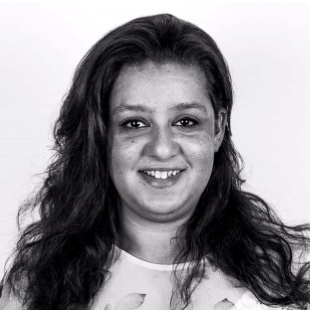
Ramadan, the month of fasting, is one of the five pillars of our faith (Along with prayer, giving charity, Hajj/pilgrimage and your declaration of faith). It is the month within which the Quran was first revealed, and is the holiest month in the Islamic calendar. It really is a beautiful time of year that brings people together. It isn’t just about fasting and abstaining from food and drink. It is also about abstaining from bad habits and endeavouring to improve yourself as a person, to give more charity and help your community; it’s about reconnecting with your spirituality and so is a time of reflection.
Some of my strongest memories of Ramadan are associated with Suhoor (or Sehri), the pre-dawn breakfast. Growing up my mother would be the first one to wake, making parathas in the kitchen for the family, with my father keeping a careful watch on us and telling us we wouldn’t be allowed to keep our fast unless we ate enough! Forcing yourself to eat something while you’re still half asleep takes some getting used to than you think!
Nowadays, I take on my mother’s role. I’m awake at 3am; and while we may have replaced parathas with porridge and toast; those sumptuous Pakistani breakfasts still make an appearance at weekends. But the beautiful thing about this time isn’t just the food. The time itself seems to have a somewhat magical atmosphere; we eat, we talk and then we pray. By the time you go back to bed you’re pretty wide awake, which is a big problem when your alarm is set for 6.30am to start the school run and work day.
My daughter’s are aged 10 and for a few years now they have wanted to join us. They used to keep half day fasts (having Suhoor with us but then eating lunch as normal since children are not expected to fast to the standards of an adult) with the occasional full day fast at the weekend. This year they have chosen to begin keeping full day fasts, and so now it’s my turn to keep a watchful eye over them at Suhoor and be worried about whether they are eating enough. But they see everyone around them fasting every year and they want to be a part of it. Their progression from half day fasts to full day fasts is part of growing up. A first for them this year will be keeping a full day fast whilst at school, again this decision has come from them; and so we’ll start with Friday’s. It’s all about easing them into it.
It’s also about educating them. This year we are going through the english translation of the Quran together. They are already learning to read the Quran in Arabic; but as we are not Arabic speakers we don’t actually understand what we are reading. This may sound strange to everyone else but it is important to read the Quran in the original language it was revealed in. However, it is also important to understand what it says. We’ve already been doing this through storytelling, but this year we’ll be reading the translation and reflecting on what we read together. We’re learning together, and understanding more about our faith is an important element of this month.
One thing that won’t happen this year are Iftar parties/gatherings. When several families will come together to open the fast together. It’s a wonderful time, with a veritable feast being prepared for everyone. At least it won’t happen the same way it used to. Perhaps we can find a restaurant with outdoor seating that serves Halal food and avoids alcohol so we can meet with family and friends for Iftar again. Then again, perhaps not, that’s a tall order for where I live.
Another really fun element of Ramadan is something we call ‘Chand Raat (in Urdu, it means ‘moon night’). Now, Chand Raat is more a cultural feature from Pakistan than it is Islamic. It takes place the night before Eid-ul-Fitr and after the new moon has been sighted. Traditionally, we apply Henna designs to our hands, gather in local bazaars to buy new bangles and generally prepare for Eid through fun and laughter. It feels like a street party as everyone gathers together and you’re all looking forward to celebrating Eid the next day. Unfortunately, with the COVID regulations we may have to give this a miss again for a second year, but we will certainly be doing our best at home.
It is also worth mentioning that it is common to have specific practices that are often taken up dependent on your locations as I know some Islamic countries alternatively have lights strung up in public squares and across city streets.
Eid-ul-Fitr starts with an additional prayer in the morning. Technically it is one of the first things you do on Eid day. Then you see family and friends. In Muslim countries its a national holiday with a three day celebration. However, having spent my life in England I’ve only ever experienced it largely as a single day celebration. That usually means trying to fit an awful lot into a single day.
When thinking about considerations for Ramadan and Eid, I thought about the following:
- On many occasions the Muslim community in Britain hasn’t always been in agreement about which specific day Eid is. Eid is declared after sighting the new moon, and everyone follows their local mosque for this decision; as that is where you will go to say your Eid prayer. Some mosques rely on the sighting happening in Britain (which I believe because of our geographical location is almost impossible to do), other mosques therefore follow the declaration made by Saudi Arabia. As an organisation, this could mean that your Muslim colleagues may not all celebrate Eid on the same day (as they likely attend different mosques).
- Ramadan is tiring, so be flexible. Working from home has made this easier, but understand that your colleagues may prefer to adjust their working hours. Towards the end of Ramadan especially, tiredness can really set in and for some people may impact their productivity at certain times of the day.
- Fasting is only mandatory for those that are physically able to do so. Therefore, at various times some colleagues may not be fasting, this could be due to medical reasons or travel or other exceptions. As the reason may be sensitive I’d recommend not pointing it out and asking them about it; just accept it as a non-fasting day for them.
- When organising work events that are centred around food or drink; if you can avoid scheduling these during the month of Ramadan, your Muslim colleagues will greatly appreciate it. It is certainly not nice to be at a work event/meeting surrounded by people eating and drinking.
- Consider adding 2 days of ‘Religious Observance’ to your annual leave allowance. Currently if Eid falls on a weekday then in order to celebrate, Muslims have to take this day off as part of their annual leave. Being able to take Eid off without it having to eat into your annual leave allowance is something that would be appreciated by all. UK national holidays are centered around the Christian faith, and so Muslims in the UK are not able to enjoy the national holiday atmosphere that they would if they were in a Muslim country. Declaring an allowance of two ‘Religious Observance’ days would accommodate all religions.
Mo Ali, IP Coordinator at Ukie:
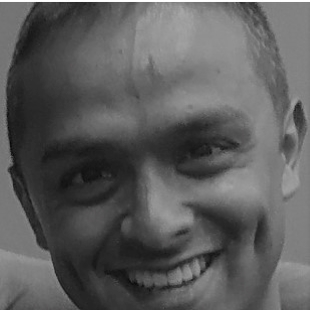
Ramadan is a time to remember and help those who are not as fortunate by doing acts of charity and paying our Zakāt (almsgiving) during the month, so as many people as possible can enjoy the celebration after a month of fasting. Which from my personal experience Eid has been the main celebration as a Muslim to meet and spend time with family and friends.
Although children do not have to fast often, you will find children want to join in. I remember as a ten year old Ramadan was in the summer so I wanted to show how easy it was by playing football in the park in the baking heat!
Don’t think I would be able to do that now but when you’re young being part of something special means a lot as you get to go to the mosque in the evening and sit down with the family for a special meal.
I also remember as a child going to the Trocadero Centre in Central London with my friends and having as many pound coins as I could fit in my pockets! Ready to challenge them at Street Fighter or Tekken, then realising everyone was way better so I spent time playing Daytona, Outrun and Sega Rally.
My children are young (8 & 6) and they want to keep mini-fasts, either waking in the morning to start the fast or skipping lunch then eating something in the afternoon. I use it as a time to remind them how fortunate we all are as there is a meal ready for us but there are many others who are the same age as them who may know when they will have their next meal. I often do a lot of volunteer work including this year making food and medical deliveries to those in desperate need during lockdown; something I feel is vital to do especially during Ramadan.
On Eid day we first pray our Fajr prayers then go to the mosque for Eid prayers. This will be the first Eid without my parents so the first thing I will do after Eid prayers is visit the graveyard. Eid is when most people will visit their loved ones who have passed away.
The rest of the day will be spent visiting family and trying not to eat too much. After a month of not eating often the thought of being able to eat is a bit too much!
As we follow the lunar calendar Ramadan starts and finishes at a different, roughly moving forward every 10 to 15 days each year. This year Ramadan will start mid-April and finish mid-May. Like all major religions there is a celebration that means more than the other events. Eid is that celebration for Muslims I find. In this busy world it’s not often everyone has time off work; therefore on Eid we can visit and meet our family and friends.
It is also worth highlighting there are two Eids, Eid al-Fitr (Which means 'festival of the breaking of the fast’) that is celebrated at the end of Ramadan, and Eid al-Adha (Which means 'feast of the sacrifice') that is celebrated just over two months later, at the same time when many Muslims perform the Hajj pilgrimage. The day we celebrate Eid is the same in that we have an additional prayer to perform but the reasons for each Eid is different. This year I plan to perform the Hajj pilgrimage so would be the first Eid spent away from my children and family.
In Muslim countries working hours are different during Ramadan and Eid is a National Holiday. In the UK Muslims will work different hours, I myself skip the lunch break so I can finish an hour earlier. I also start earlier when my mind is fresh and have more energy, trying to avoid long conference calls or meetings in the afternoon. I have found telling colleagues and people you work with about Ramadan makes it easier to arrange meetings and calls. Most people understand you can’t make a lunch meeting or meet for a coffee.
Issam Ghosheh, Ad Operations Manager at Sony Interactive Entertainment:
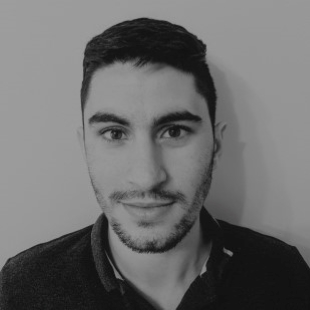
Ramadan is such a key time in the Muslim calendar all across the globe, with almost 2 billion people globally celebrating it in one way or another. Ramadan is focused on heightened spirituality but also with self-reflection and discipline, helping people almost reset some of the bad habits they have picked up throughout the year, to try and improve themselves.
In my experience this is normally done by Fasting (Not Eating, Drinking - Not even water), Smoking and other restrictions during Sunlight hours and increased spirituality. It's funny because people are usually shocked when I tell them I'm looking forward to Ramadan, whereas many people know it as me suffering not eating and drinking for most of the day, every day for a month. And while, yes that's what's involved - there is so much more to it than that:
- It's a time for developing strong bonds between your family and friends, visiting people and being visited by people, enjoying their company.
- Being present and in the moment and understanding how privileged our situations are and being grateful for it.
- Yes the point is not to eat and drink during the day but it's also a time for amazing food in the evenings (Hats off to all of the cooks and chefs out there who have to smell that amazing food while it's cooking but can't eat any) with some of the best tasting dishes being served for fast break (It may also help that everybody is so hungry).
Some of my best memories around Ramadan are based around breaking fast with family and friends and the last few moments leading up to it. There's something magical about breaking your fast and knowing that so many others are doing so at the exact same time.
Something that is a repeating memory but a vivid one is this moment where everybody is together calmly talking and enjoying themselves and then suddenly people’s phones start going off with the call to prayer – all usually at slightly different times, causing a wall of incomprehensible noise that signifies fast break (Iftar). From this, madness then erupts with plates of dates being handed around and eaten, water and milk being drunk and the smokers all quickly rushing off to have their first smoke of the day before people go and pray together.
This year will be a strange one, finally being able to see family members and friends yet in small groups outside. Though it will probably still capture a staple for Fast Breaking. I know visiting restaurants with outdoor seating is something that’s been much awaited in my family so I can see that happening for many others. Everybody being cautious (and rightly so), it won’t feel fully right but hopefully will feel like a step in the right direction to “Normality”.
I would like to finish my part with some considerations to take in mind when thinking about Ramadan and those in the games industry who celebrate it:
- I think the best one is to understand that this, like other things, is not a one size fits all approach.
- Now you may see a Muslim colleague eating something or taking a sip of water, but please resist the urge to question it as there are quite a few reasons why your Muslims colleagues might not be fasting, such as sickness or chronic illness (Needing to eat for medical purposes like being diabetic). If they are travelling long distances. Pregnancy, breastfeeding or menstruation. The main point being people shouldn’t be put into a position where fasting is damaging to their bodies regardless of spiritual needs.
Conclusion
BAME@PlayStation and #RaiseTheGame wishes all those observing Ramadan a blessed and auspicious time.
#RaiseTheGame hopes to do more pieces like this as it not only vital for a growing community within the games industry to have their voice heard and representation seen, yet it overall helps in making the games industry a more welcoming place thanks to the lived experiences of those in industry and the considerations suggested to make positive impact.
We welcome everyone reading this piece to learn more about Ramadan, a great source is the Muslim Council of Britain who have launched a #SafeRamadan guide on its website which provides more information about Ramadan and how Muslims can safely make the most of this month both spiritually and socially.
If you haven't heard or seen yet, #RaiseTheGame is partnering with the BAME@PlayStation employee group of Sony Interactive Entertainment (SIE) to put together an awareness event all about Ramadan and Muslim Representation in games on 5th May at 4:00pm BST.
For more details and to sign up for the event, check out the Eventbrite page.